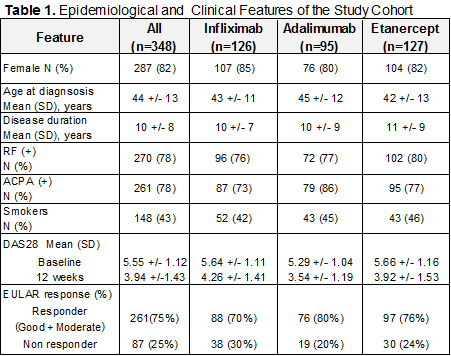Session Information
Session Type: Abstract Submissions (ACR)
Background/Purpose
TNF-α inhibitors have significantly improved the prognosis of patients with Rheumatoid Arthritis (RA). Despite this, approximately 30% of patients fail to achieve a satisfactory clinical response. One of the main challenges of personalized medicine in RA is being able to predict those patients that have an increased likelihood of not responding to anti-TNF therapies so that such patients can be selected for other biological therapies. Recently, evidence for a specific association of the non synonymous SNP in FCGR2A with infliximab response has been reported. The aim of our study was to replicate this genetic association in an independent cohort of patients with RA.
Methods
A total of 348 RA patients treated with TNF-alpha inhibitors (i.e. Infliximab n=126, Adalimumab n=95, Etanercept n=127) were genotyped for FCGRA H131R polymorphism (i.e. rs1801274). Response to anti-TNF therapies was measured at 12-14 weeks of therapy using the EULAR response criteria. Association of clinical and epidemiological variables to treatment response was analyzed using linear model regression. Good and moderate responders were merged in a single responder group and association analyses were performed using logistic regression.
Results
The clinical characteristics of the RA patient cohorts according to anti-TNF treatment are shown in Table 1. We found a significant association (P=0.05) between smoking status (actual and past smokers vs non-smokers) and response to anti-TNF agents. No other clinical or epidemiological variable showed an association to treatment response. We found a significant association of FCGR2A SNP rs1801274 with treatment response in Adalimumab-treated patients (P=0.01, OR (95%CI) = 0.32(0.18-0.83)) but not in Infliximab (P=0.3) or Etanercept-treated patients (P=0.82). Including smoking status as a covariate of rs1801274 association with treatment response showed no evidence of confounding (PFCGR2A = 0.01).
Conclusion
We have found, for the first time a specific association of FCGR2A with the response to Adalimumab in RA at 3 months of therapy. The lack of validation of the previous specific association of FCGR2A with Infliximab could be due to the low effect size of the genetic association or to differences between patient cohorts. Finally, we have also found a positive association with smoking and the response to anti-TNF agents.
Disclosure:
G. Avila,
None;
J. Tornero,
None;
A. Fernandez Nebro,
None;
F. Blanco,
None;
I. Gonzalez-Alvaro,
None;
J. D. Cañete,
None;
J. Maymo,
None;
J. Ballina,
None;
B. Fernandez Gutierrez,
None;
A. Olivé,
None;
H. Corominas,
None;
A. Erra,
None;
R. Tortosa,
None;
M. A. López-Lasanta,
None;
A. Aterido,
None;
A. Julia,
None;
S. Marsal,
None.
« Back to 2014 ACR/ARHP Annual Meeting
ACR Meeting Abstracts - https://acrabstracts.org/abstract/fcgr2a-polymorphism-and-response-to-anti-tnf-treatment-in-rheumatoid-arthritis/

